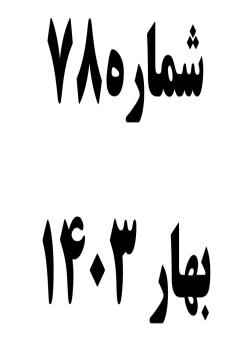Identify and Prioritize the Cultural Elements of Sustainable Curriculum for Management with Environmental Approach at Islamic Azad University of Tehran Province
Subject Areas : Educational Science
Elham Noorin
1
![]() ,
soghra afkaneh
2
*
,
کامران محمدخانی
3
,
soghra afkaneh
2
*
,
کامران محمدخانی
3
1 - دانشجوی دکتری برنامه ریزی درسی، واحد رودهن، دانشگاه آزاد اسلامی، تهران، ایران
2 - استادیار، گروه علوم تربیتی، واحد رودهن، دانشگاه آزاد اسلامی، رودهن،ایران.(نویسنده مسئول)
3 - استادیار دانشگاه آزاد اسلامی، واحد علوم و تحقیقات، دانشکده مدیریت و اقتصاد ، گروه مدیریت آموزش عالی
Keywords: Sustainable curriculum, management field, environmental approach,
Abstract :
This research was carried out with the aim of identifying and prioritizing sustainable curriculum elements for management majors with an environmental approach in University.The purpose of the applied research and the type of data is a combination of exploratory type in the qualitative part, meta-synthesis and analysis of interview texts, and descriptive-survey in the quantitative part. Was.The population studied in the qualitative part included the theoretical foundations and related background of internal and external databases and for the interview part of the expert community. The sample size in the qualitative part was targeted non-random sampling and in the quantitative part, the sample size was based on the calculation of the sample size in The structural equations were selected by step wise cluster random sampling method.The collection tools were systematic literature review and semi-structured interviews in the qualitative part, and researcher-made questionnaires in the quantitative part.The method of data analysis was thematic analysis in the qualitative part and descriptive and inferential statistics in the quantitative part.The findings showed that the identified elements of the sustainable curriculum for management majors with an environmental approach in University included 5 elements,which in order of priority are:Purpose (components of getting to know the concepts, management)content (components of management concepts and principles,tools and methods,rights and settings,strategies and policies, green economy and environmental resource management) learning methods (interactive, practical and experimental methods, project-based) evaluation methods (performance, content and lessons, educational environment.resources(use of sustainable materials, product life cycle.that each of these components included several indicators.
احمدی مقدم، افسانه؛ پورعمران، محبوبه و اسماعیلی شاد، بهرنگ. (1400). شناسایی مولفه های برنامه درسی سبز و ارائه الگوی مطلوب به منظور ارتقا فرهنگ زیست محیطی دانش آموزان دوره دوم ابتدایی. فصلنامه علوم و تکنولوژی محیط زیست، 23 (9)، 138-125.
حسين پور، محمد. (1396). بررسي برنامه هاي درسي رشته آموزش و پرورش ابتدايي ازديدگاه استادان علوم تربيتي به منظور ارتقاي سطح آگاه يهاي زيست محيطي دانش آموختگان اين رشته. فصلنامه علوم و تكنولوژي محيط زيست، 12 (2)، 331-420.
سرلک، ناهید؛ ناطقی، فائزه و جلالوندی، مهناز. (1398). واکاوی دیدگاه دبیران و اساتید در زمینه وضعیت موجود جایگاه آموزش زیست محیطی در برنامه درسی دوره اول متوسطه. نشریه مطالعات علوم محیط زیست، 4 (4)، 1973-1963.
عابدی سروستانی، احمد. (1393). کارکردهای اجتماعی مزرعه های خانوادگی در فرایند توسعه پایدار روستایی: سنجش گرایش کارشناسان کشاورزی استان گلستان. مجله راهبردهای توسعه روستایی، 1 (3)، 111-97.
فريدون، عبدالحسين. (1393). آموزش عالي و توسعه ملي. مجموعه مقالات همايش آموزش عالي و توسعه پايدار. تهران: موسسه پژوهش و برنامه ريزي آموزش عالي.
فضلی، یداله، آراسته، حمیدرضا، رضازین آبادی، حسن، و عبداللهی، بیژن. (1400). تحلیل شکاف برنامه درسی قصد شده دوره کارشناسی ارشد رشته مدیریت آموزشی با توجه به چالش ها و مشکلات موجود در مدیریت مدارس در ایران. مطالعات برنامه درسی آموزش عالی، 12(24 )، 139-171.
قورچيان، نادر قلي. (1393). دانشگاه به مثابه الگويي براي توسعه پايدار؛ پارادايمي جديد. مجموعه مقاالت همايش آموزش عالي و توسعه پايدار، تهران موسسه پژوهش و برنامهريزي آموزش عالي.
منتظری, یعقوبی پور, جلالیان. (1401). الگوی ساختاری تفسیری پیشرانهای بهرهوری پایدار مبتنی بر دانش و آگاهی محیطزیستی. فصلنامه علمی آموزش محیط زیست و توسعه پایدار, 11(2), 29-50.
میررحیمی، مهدیه السادات؛ صمدی، پروین و احمدی، پروین. (1402). سرسپردگی توسعه پایدار در برنامه درسی گردشگری آموزش عالی. نشریه مدیریت و برنامه ریزی در نظام های آموزشی، 30 (11)، 7-19.
Barth, M., Michelsen, G., Rieckmann, M., & Thomas, I. (Eds.). (2015). Routledge handbook of higher education for sustainable development. Routledge.
Bergman, Z., Bergman, M. M., Fernandes, K., Grossrieder, D., & Schneider, L. (2018). The contribution of UNESCO chairs toward achieving the UN sustainable development goals. Sustainability, 10(12), 4471.
Eilks, I. (2015). Science education and education for sustainable development–justifications, models, practices and perspectives. Eurasia Journal of Mathematics, Science and Technology Education, 11(1), 149-158.
Foster, G., & Stagl, S. (2018). Design, implementation, and evaluation of an inverted (flipped) classroom model economics for sustainable education course. Journal of Cleaner Production, 183, 1323-1336.
Justice, S. C. (2018). UNESCO global geoparks, geotourism and communication of the earth sciences: A case study in the Chablais UNESCO Global Geopark, France. Geosciences, 8(5), 149.
Owen, G. (2015). Integrated reporting: A review of developments and their implications for the accounting curriculum. Sustainability in Accounting Education, 43-59.
Pietarinen, J., Pyhältö, K., & Soini, T. (2017). Large-scale curriculum reform in Finland–exploring the interrelation between implementation strategy, the function of the reform, and curriculum coherence. The Curriculum Journal, 28(1), 22-40.
Sammalisto, K., Sundström, A., & Holm, T. (2015). Implementation of sustainability in universities as perceived by faculty and staff–a model from a Swedish university. Journal of Cleaner Production, 106, 45-54.
Seatter, C. S., & Ceulemans, K. (2017). Teaching Sustainability in Higher Education: Pedagogical Styles that Make a Difference. Canadian Journal of Higher Education, 47(2), 47-70.
Young, T. C., & Malone, K. (2023). Reconfiguring environmental sustainability education by exploring past/present/future pedagogical openings with preservice teachers. Teaching in Higher Education, 28(5), 1077-1094
.

